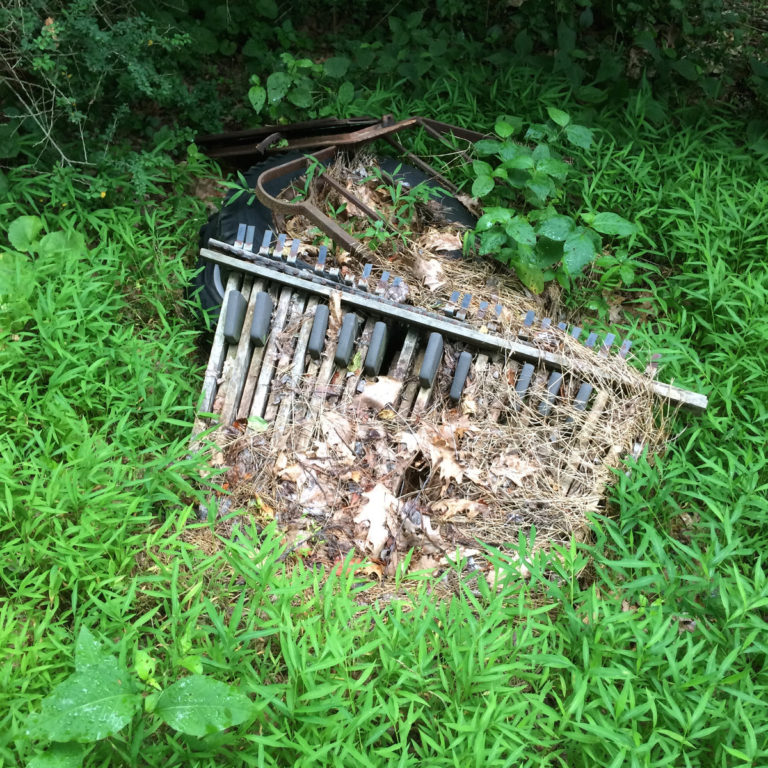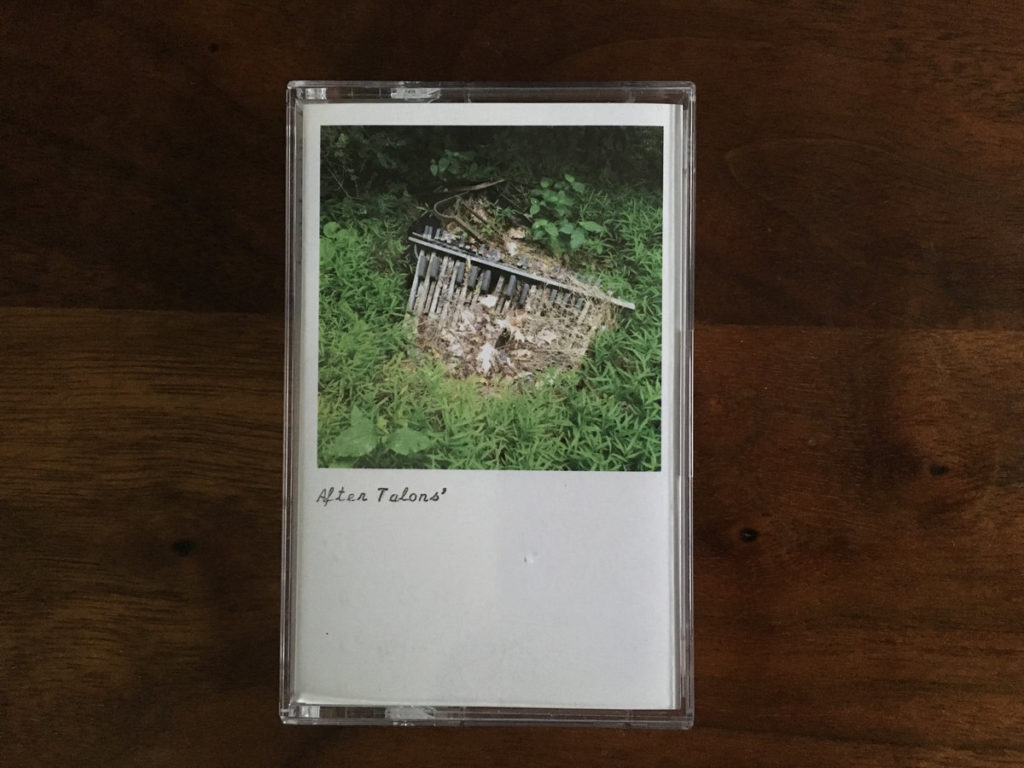We’ve written a lot about Talons’, the recording project of Ohio’s Mike Tolan, and thus were very excited to see them release a new album at the beginning of the year. But, as is sometimes the case, the album wasn’t one we could just right a few lines about, and so it’s taken over half a year to post this review.
After Talons’ feels like Tolan’s attempt to consolidate his oeuvre, many of the tracks returning from previous releases in slightly different guises. But of course the world keeps changing too, and songs that began as explorations of something creeping in to the American psyche post-9/11 seem to only get more relevant as we continue with our small and quiet lives in the strange, hyperreal contemporary world. As Tolan describes, this is “an album about looking back because looking forward is too confusing in such a weird world […] about the strange melancholy of mid-30s contentment, a sadness that is only kept from descending into raw despair by having a partner to stare into the darkness with.”
That last bit is important, because After Talons certainly isn’t raw despair. It brings to mind something I read by Marilynne Robinson on the “very sharp” distinction between hope and optimism, and how we can hold on the the former even if the latter is in short supply. Listening to After Talons’, I think it’s fair to assume that Tolan views the relationship between our lives and the wider world in a similar way to Robinson. Optimism is unquestionably hard to come by, but that doesn’t mean we can’t have hope.
Earlier releases, especially songs for boats, focused on escaping the humdrum of existence by fleeing to the woods, a preoccupation often imagined in a vaguely apocalyptic kind of scenario, a societal collapse caused perhaps by the financial crisis at the end of the last decade. Those daydreams have always been romantic, a strange yearning for the routinely uncomfortable simplicity that our ancestors had to cope with. Imagine governments and the like stood back as The Crash destroyed the very markets that had caused it, refusing to apply desperate CPR to be billed to the general public. Why is this idea so seductive? Perhaps it’s nicer to imagine ourselves vulnerable in plain, primitive ways, the struggle to light fires and hunt our dinner, rather than defenceless against the incomprehensible tangle of systems and corporations. An immediate, organic fear might be preferable to the chronic dread conjured by the mindless, soulless economic machinations that run society.
But of course, this scenario has never come to fruition (at least not for us in the West). As the secondhand quote in an essay by Marxist lit critic Frederic Jameson puts it: “It’s easier to imagine the end of the world than the end of capitalism.” Thus, the idea of the world ending in some dramatic event, leaving us in a small but heroically resourceful group of survivors, becomes a quaint fantasy, and After Talons’ can be viewed as Tolan realising this fact.
‘Dark Age’ plays out like the literal manifestation of this realisation, “After the world didn’t end,” Tolan sings, “we came down out of the woods and couldn’t remember where we parked the car.” With nods to old songs in the forms of samples (such as snippets of ‘Rowboat’ and ‘Old Kayak’), the track is a neat summation of everything Talons’ have been doing in the last decade. It describes a vacuum of post-Millennial disillusionment and that curious kind of shame that comes with living a pretty comfortable life in 2018. But there is hope too, particularly in the second half, when the song seems to light up from within and Tolan delivers the uncannily stirring lines:
“And will we ever
find our places in this fucked up world?”
[bandcamp width=100% height=120 album=2768771663 size=large bgcol=ffffff linkcol=0687f5 tracklist=false artwork=small track=1070163903]
Tolan recorded After Talons in the room above his garage at home, and the album’s birthplace leaches into its sound. “This recording is meant to sound like that room,” he says, “the natural reverb of the wood floors and sloped ceiling. The sounds of the insects at night, the rain, the generators in the nearby allotment after a wind storm.” This is clearly apparent on songs like ‘All that hasn’t burned is drowned’, with its tales of house fires and leaky roofs, juxtaposing the violence of reality with a quiet sense that things will be okay. As Tolan offers, “And the light from the flames is flashing on you while you sleep / and there is calm at the end of all things.” ‘Milwaukee’ follows suit, shimmering and flickering and ending on a line that sums up After Talons’ perfectly:
“I guess I’m somewhere between relief and despair
but the more I think about it the less I care.”
[bandcamp width=100% height=120 album=2768771663 size=large bgcol=ffffff linkcol=0687f5 tracklist=false artwork=small track=113410120]
The sense of solitude is also palpable. A track that first appeared way back on Songs for Babes, ‘April’ is all lonely guitar and wrenchingly honest musings on relationships. In some ways this is the bleakest moment on the record, devoid of both optimism and hope, the musical equivalent of an anxious weekend alone pacing empty rooms as your brain crawls the walls. However, despite detailing the timeless difficulties of connecting with other human beings, the winds of consumerism again shape the landscape, where real people attempt to ‘realise’ themselves by becoming more like the characters they see on TV, and the accumulation of goods is the primary analgesic.
‘The Plane’ holds anxiety of a different, albeit-related kind. Represented by a very 21st century dread of planes falling from the sky, the song explores the strange confliction of witnessing and being emotionally affected by calamity and disaster, but all the while remaining personally removed and untouched. “No one we knew died,” Tolan sings, “No one we’d ever know died.” The metaphor works for much of the Western middle class experience, the way things are both terrible and not, the fact that we are aware of and sincerely unhappy about injustice and inequality, yet relatively safe from it, comfortable amidst our many things.
‘Breaking Bad’ is a song about getting older, about lonely nights out and preferring to stay at home with a loved one, while ‘19’ also focuses its scope back toward the past, a sonic daydream that rises from avoiding car troubles (“the engine light is on again, I cover it up, cos I can’t deal with this right, no that’s a lie, I don’t wanna deal with this right now”). This is a life imagined without the gnawing and strangely debilitating responsibilities of adulthood, being 19 in perpetuity. ‘Driving Home From Shows’, a track that first appeared on an album of demos in 2013, is sparse and sad, even for Talons’. Again the song details the difficulty of getting older, though there’s no nihilism here. In fact, it’s anything but, our narrator searching for the sense of “heavy-hearted hope” that he just might not have lost forever, and, in doing so, offering the possibility for us too.
Closer ‘Tired of IPAs’ is what we previously described as “a poignant and meandering acoustic song that reads like an anti-anthem for unhappy millennials, for the hordes of young adults still smarting from the dissipation of all those hopes and dreams, of trying to grow up and become more pragmatic, living in fear of losing more than their childish silliness.” But it also offers the closest thing to a solution on the album. If not a remedy then at least a coping mechanism, something to hold onto as you go about your days.
“What am I doing? What am I going to do now at 32 without a plan?
I guess I’ll keep making things
Try to make do
And find goodness where I can”
[bandcamp width=100% height=120 album=2768771663 size=large bgcol=ffffff linkcol=0687f5 tracklist=false artwork=small track=4198073149]
After Talons’ is more than just another great album, its the culmination of everything that’s come before and one that deserves all of your time and attention. Talons’ capture the futility and hopelessness of a content life in a creaking hyper-capitalist society, an existence often devoid of meaning and full of shame at the hypocrisy in caring about the world but doing little to change it. But it’s also kind-hearted too, its glowing core of humanity somehow comforting despite the heavy subject matter. In other words, there’s no optimism here, but there is hope.
Get After Talons’ now on cassette from Imperial Emporium Sound Options and as a download from the Talons’ Bandcamp page.


